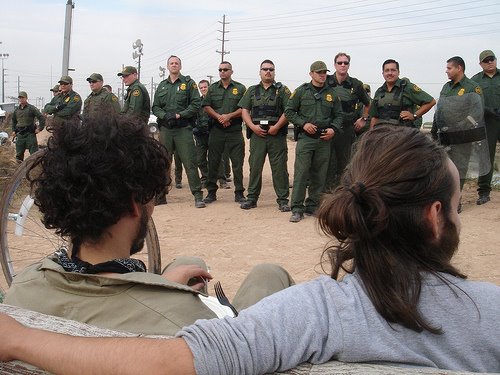By RANDAL C. ARCHIBOLD
Published: October 6, 2009
New York Times
PHOENIX — The Maricopa County sheriff, who has drawn scorn and praise for a running crackdown on illegal immigrants in this city’s metropolitan area, said Tuesday that federal officials had taken away his deputies’ authority to make immigration arrests in the field.
The sheriff, Joe Arpaio, whose high-profile sweeps have been cited in the fevered debate over the need for an overhaul of immigration laws, said he had sought a renewed agreement with the Department of Homeland Security to allow both field arrests and immigration checks at his jails. But a high-level department official presented a document a couple of weeks ago allowing only for jail checks, Mr. Arpaio said.
That prompted an angry, rambling outburst from the sheriff Tuesday at a news conference at which he called Homeland Security officials “liars” and vowed to press on with his campaign, using state laws, against illegal immigrants. He said he would drive those caught on the streets to the border if federal officers refused to take them into custody.
Homeland Security officials declined to comment, saying they are still reviewing their agreement with the sheriff’s department and the other 65 agencies that participate in a program that allows local and state officers to make immigration arrests.
Immigrant advocates and some lawmakers have called on the department to end the program, known as 287(g) after the section of the 1996 law that authorized it, saying it has led to racial profiling and other abuses. Several advocates put out statements Tuesday expressing dismay that the department was keeping any relationship with Mr. Arpaio.
Last week, the Congressional Hispanic Caucus wrote to President Obama, urging him to “immediately terminate” the program because of the complaints.
A report this year by Congress’ watchdog, the Government Accountability Office, found that the program had not been closely supervised and that it had often led to the arrest of minor offenders instead of the criminals it was intended to pursue.
The Homeland Security Department has sought to mend it the program, not end it.
Immigration and Customs Enforcement, the agency that runs it, this summer announced an overhaul of the program and sought to reach new agreements with the agencies involved. Two agencies in Massachusetts have since announced their withdrawal from the program.
The Maricopa County Sheriff’s Office, with some 160 federally trained deputies, is the largest in the program and the most closely scrutinized by people on all sides of the immigration debate.
Mr. Arpaio conceded that the vast majority of the 33,000 arrests of illegal immigrants his office has made in the past two years under the agreement followed a check on the immigration status of people in jails. About 300 have been arrested in the field during “crime suppression” operations, he said. He called those arrests symbolically important.
“It has to do with public perception,” he said, noting reports that some illegal immigrants are leaving the area in part because of his deputies. “I think the bad guys apparently are leaving because they know they are here illegally. This is a crime deterrent program, too.”
In March, the Justice Department’s civil rights division announced that it was investigating the department, but Mr. Arpaio has conducted sweeps since then and he predicted that he would be exonerated.
The Maricopa agreement was also being watched to see if Homeland Security Secretary Janet Napolitano, a Democrat and the former governor of Arizona, would take the opportunity to rein in Mr. Arpaio, a Republican and one of the state’s most popular figures. Although they did not often clash publicly, their political supporters often lashed out at one another.
By the account of Mr. Arpaio and his aides, he signed a copy of a new agreement on Sept. 21, allowing for both field and jail arrests. But that evening, Alonzo Pena, a top Immigration and Customs Enforcement official, called from Washington and said he would be arriving in Phoenix the next day to discuss it.
After he arrived, Mr. Pena presented Mr. Arpaio another agreement that allowed only for jail checks.
Mr. Arpaio signed it, but it still must be approved by the county’s governing board. The board has been sympathetic to Mr. Arpaio on immigration matters, but he suggested the vote was far from a done deal.
Either way, he and his supporters vowed to press on.
Andrew Thomas, the county attorney, appeared with Mr. Arpaio to voice his support and condemn the “setback in the fight against illegal immigration.” Mr. Thomas said, “The fight goes on.”
He and Mr. Arpaio suggested that deputies could use the state anti-human smuggling law to make stops and refer suspected illegal immigrants to Immigration and Customs Enforcement, though it was not clear whether the agency would take them.
If not, the sheriff said, “I’ll take a little trip to the border and turn them over to the border.”
Read @ New York Times: http://www.nytimes.com/2009/10/07/us/07arizona.html

No comments:
Post a Comment